Equity and Trusts: A Comprehensive Analysis of Legal Framework
VerifiedAdded on 2020/10/05
|6
|2141
|385
Essay
AI Summary
This essay provides a comprehensive overview of equity and trusts within the UK legal system. It defines equity as fairness and justice, contrasting it with the concept of trusts where a trustee holds property for a beneficiary. The essay delves into the maxims of equity, such as the requirement for clean hands and acting in a timely manner, and explains different types of trusts, including express, constructive, and resulting trusts. It emphasizes the powers and duties of trustees, including the duty to act unanimously, with reasonable care and skill, and honestly, while avoiding personal benefit. The essay highlights the importance of fiduciary relationships, the role of agents, custodians, and nominees, and the potential for legal remedies in cases of breach of trust. It references key legal scholars and cases to illustrate these principles, concluding that a trust is a powerful legal tool that can be enforced by beneficiaries through the courts.
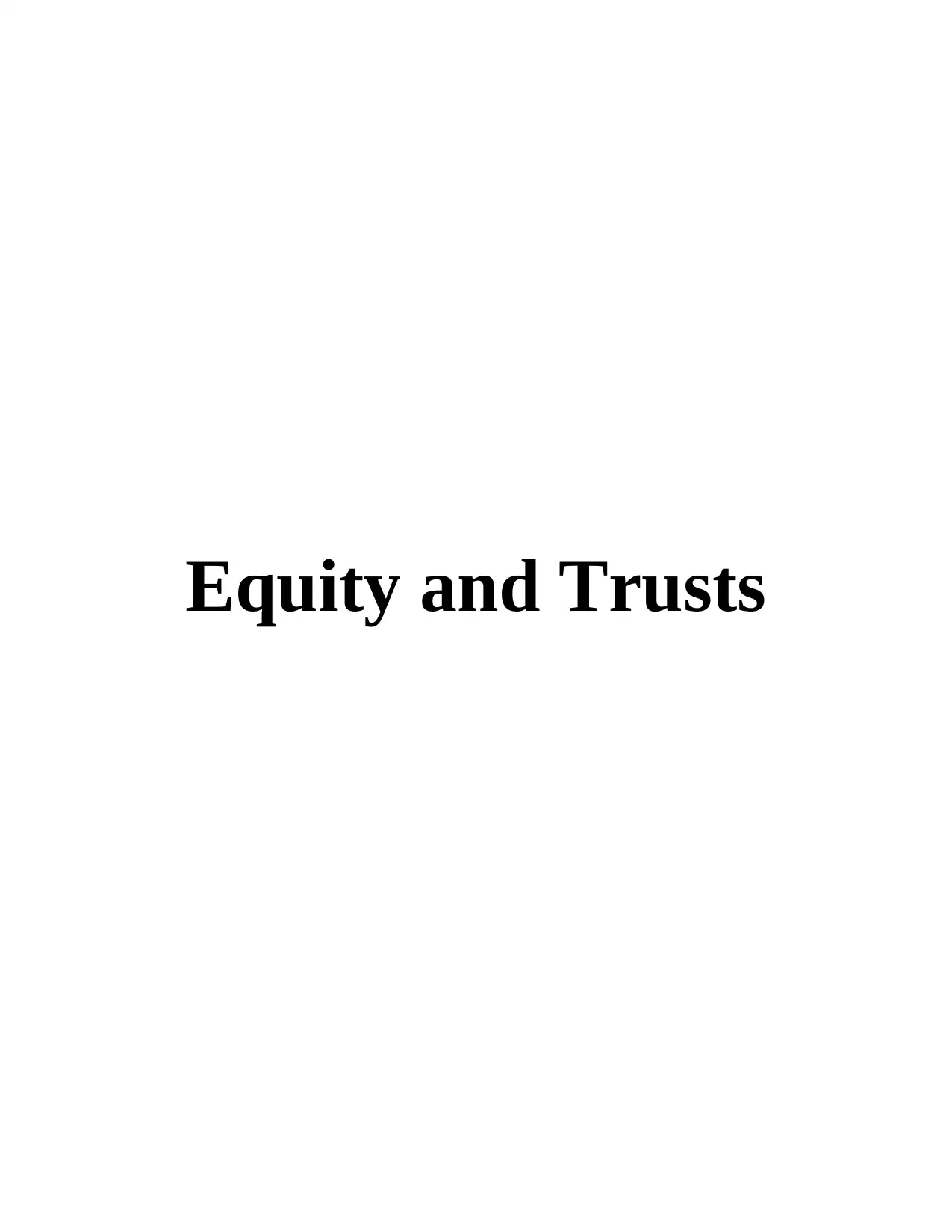
Equity and Trusts
Paraphrase This Document
Need a fresh take? Get an instant paraphrase of this document with our AI Paraphraser
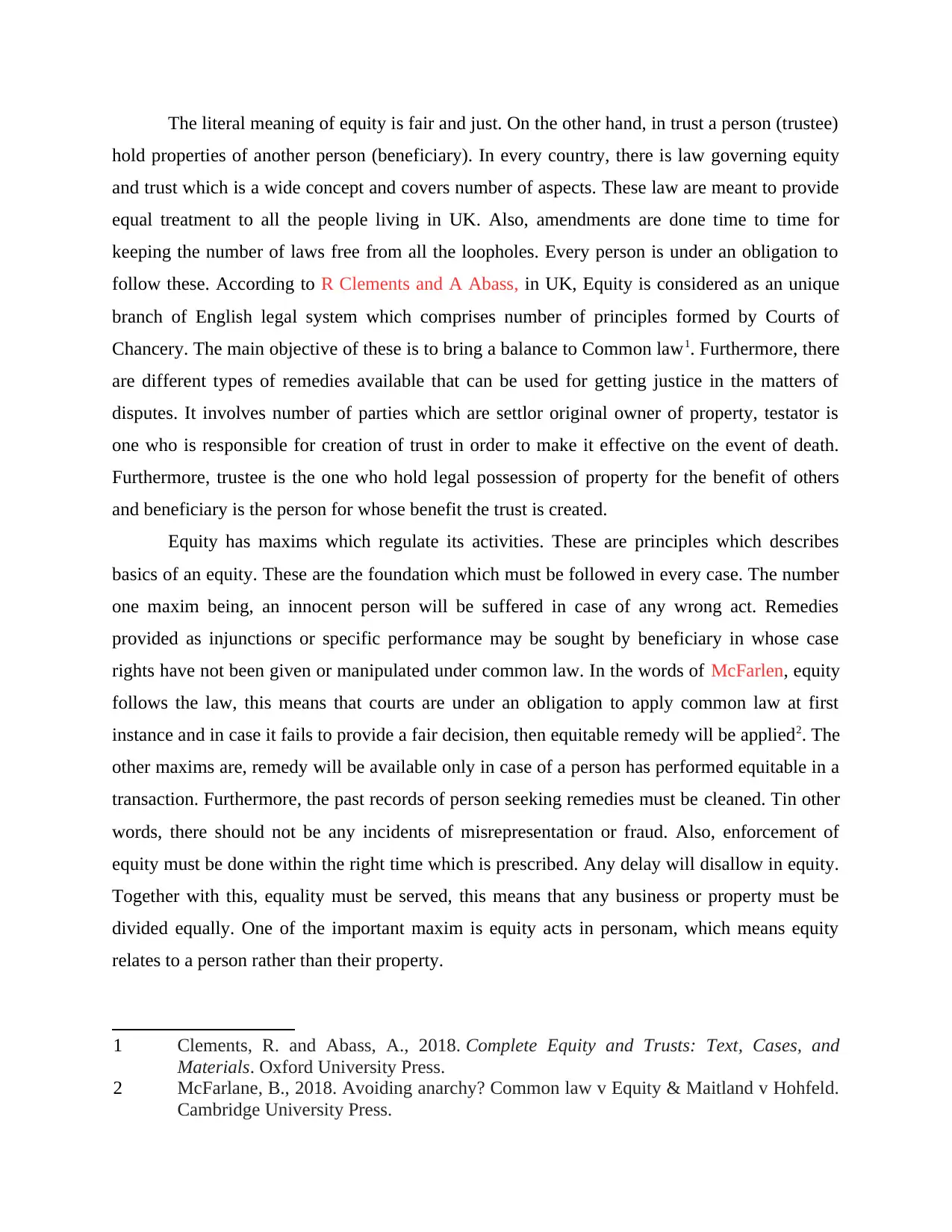
The literal meaning of equity is fair and just. On the other hand, in trust a person (trustee)
hold properties of another person (beneficiary). In every country, there is law governing equity
and trust which is a wide concept and covers number of aspects. These law are meant to provide
equal treatment to all the people living in UK. Also, amendments are done time to time for
keeping the number of laws free from all the loopholes. Every person is under an obligation to
follow these. According to R Clements and A Abass, in UK, Equity is considered as an unique
branch of English legal system which comprises number of principles formed by Courts of
Chancery. The main objective of these is to bring a balance to Common law1. Furthermore, there
are different types of remedies available that can be used for getting justice in the matters of
disputes. It involves number of parties which are settlor original owner of property, testator is
one who is responsible for creation of trust in order to make it effective on the event of death.
Furthermore, trustee is the one who hold legal possession of property for the benefit of others
and beneficiary is the person for whose benefit the trust is created.
Equity has maxims which regulate its activities. These are principles which describes
basics of an equity. These are the foundation which must be followed in every case. The number
one maxim being, an innocent person will be suffered in case of any wrong act. Remedies
provided as injunctions or specific performance may be sought by beneficiary in whose case
rights have not been given or manipulated under common law. In the words of McFarlen, equity
follows the law, this means that courts are under an obligation to apply common law at first
instance and in case it fails to provide a fair decision, then equitable remedy will be applied2. The
other maxims are, remedy will be available only in case of a person has performed equitable in a
transaction. Furthermore, the past records of person seeking remedies must be cleaned. Tin other
words, there should not be any incidents of misrepresentation or fraud. Also, enforcement of
equity must be done within the right time which is prescribed. Any delay will disallow in equity.
Together with this, equality must be served, this means that any business or property must be
divided equally. One of the important maxim is equity acts in personam, which means equity
relates to a person rather than their property.
1 Clements, R. and Abass, A., 2018. Complete Equity and Trusts: Text, Cases, and
Materials. Oxford University Press.
2 McFarlane, B., 2018. Avoiding anarchy? Common law v Equity & Maitland v Hohfeld.
Cambridge University Press.
hold properties of another person (beneficiary). In every country, there is law governing equity
and trust which is a wide concept and covers number of aspects. These law are meant to provide
equal treatment to all the people living in UK. Also, amendments are done time to time for
keeping the number of laws free from all the loopholes. Every person is under an obligation to
follow these. According to R Clements and A Abass, in UK, Equity is considered as an unique
branch of English legal system which comprises number of principles formed by Courts of
Chancery. The main objective of these is to bring a balance to Common law1. Furthermore, there
are different types of remedies available that can be used for getting justice in the matters of
disputes. It involves number of parties which are settlor original owner of property, testator is
one who is responsible for creation of trust in order to make it effective on the event of death.
Furthermore, trustee is the one who hold legal possession of property for the benefit of others
and beneficiary is the person for whose benefit the trust is created.
Equity has maxims which regulate its activities. These are principles which describes
basics of an equity. These are the foundation which must be followed in every case. The number
one maxim being, an innocent person will be suffered in case of any wrong act. Remedies
provided as injunctions or specific performance may be sought by beneficiary in whose case
rights have not been given or manipulated under common law. In the words of McFarlen, equity
follows the law, this means that courts are under an obligation to apply common law at first
instance and in case it fails to provide a fair decision, then equitable remedy will be applied2. The
other maxims are, remedy will be available only in case of a person has performed equitable in a
transaction. Furthermore, the past records of person seeking remedies must be cleaned. Tin other
words, there should not be any incidents of misrepresentation or fraud. Also, enforcement of
equity must be done within the right time which is prescribed. Any delay will disallow in equity.
Together with this, equality must be served, this means that any business or property must be
divided equally. One of the important maxim is equity acts in personam, which means equity
relates to a person rather than their property.
1 Clements, R. and Abass, A., 2018. Complete Equity and Trusts: Text, Cases, and
Materials. Oxford University Press.
2 McFarlane, B., 2018. Avoiding anarchy? Common law v Equity & Maitland v Hohfeld.
Cambridge University Press.
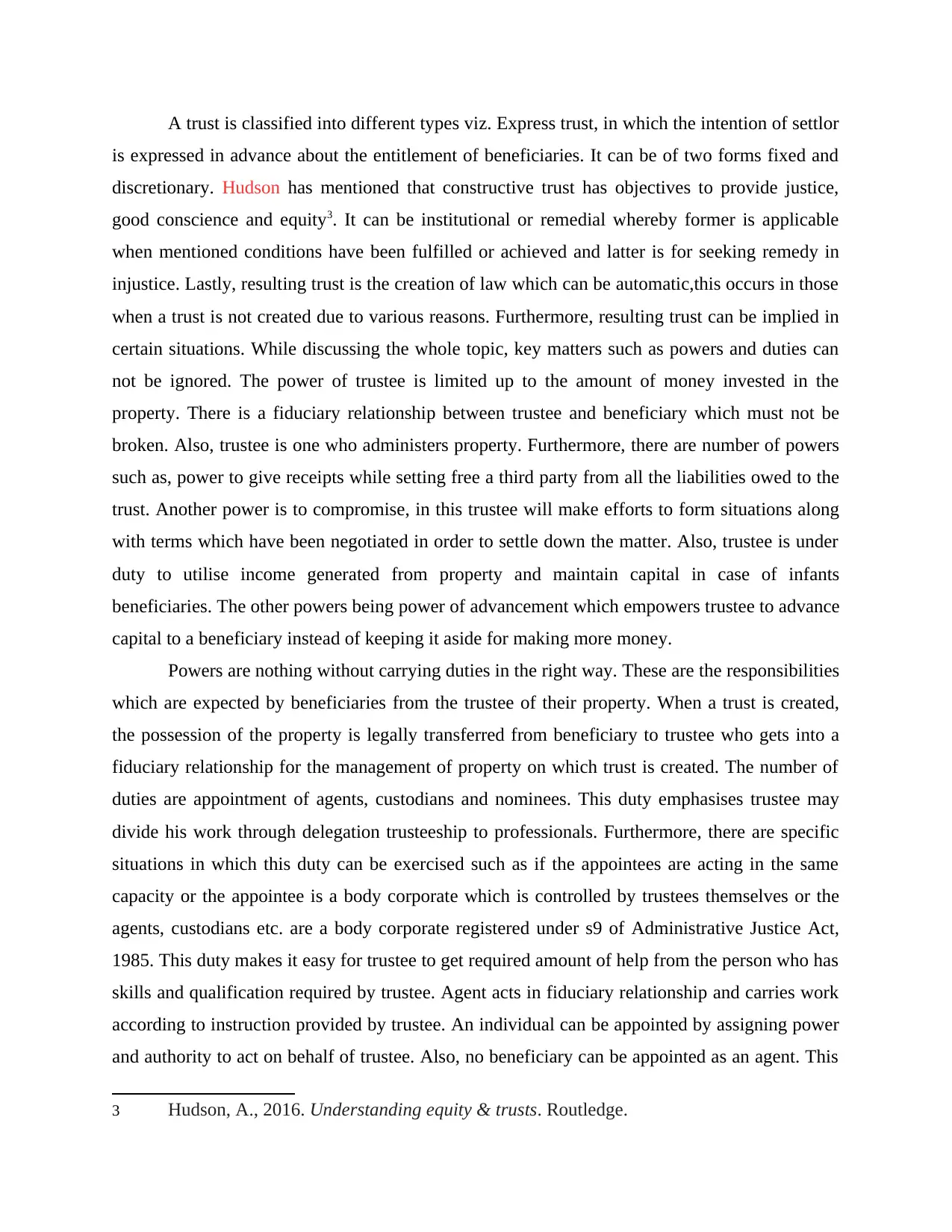
A trust is classified into different types viz. Express trust, in which the intention of settlor
is expressed in advance about the entitlement of beneficiaries. It can be of two forms fixed and
discretionary. Hudson has mentioned that constructive trust has objectives to provide justice,
good conscience and equity3. It can be institutional or remedial whereby former is applicable
when mentioned conditions have been fulfilled or achieved and latter is for seeking remedy in
injustice. Lastly, resulting trust is the creation of law which can be automatic,this occurs in those
when a trust is not created due to various reasons. Furthermore, resulting trust can be implied in
certain situations. While discussing the whole topic, key matters such as powers and duties can
not be ignored. The power of trustee is limited up to the amount of money invested in the
property. There is a fiduciary relationship between trustee and beneficiary which must not be
broken. Also, trustee is one who administers property. Furthermore, there are number of powers
such as, power to give receipts while setting free a third party from all the liabilities owed to the
trust. Another power is to compromise, in this trustee will make efforts to form situations along
with terms which have been negotiated in order to settle down the matter. Also, trustee is under
duty to utilise income generated from property and maintain capital in case of infants
beneficiaries. The other powers being power of advancement which empowers trustee to advance
capital to a beneficiary instead of keeping it aside for making more money.
Powers are nothing without carrying duties in the right way. These are the responsibilities
which are expected by beneficiaries from the trustee of their property. When a trust is created,
the possession of the property is legally transferred from beneficiary to trustee who gets into a
fiduciary relationship for the management of property on which trust is created. The number of
duties are appointment of agents, custodians and nominees. This duty emphasises trustee may
divide his work through delegation trusteeship to professionals. Furthermore, there are specific
situations in which this duty can be exercised such as if the appointees are acting in the same
capacity or the appointee is a body corporate which is controlled by trustees themselves or the
agents, custodians etc. are a body corporate registered under s9 of Administrative Justice Act,
1985. This duty makes it easy for trustee to get required amount of help from the person who has
skills and qualification required by trustee. Agent acts in fiduciary relationship and carries work
according to instruction provided by trustee. An individual can be appointed by assigning power
and authority to act on behalf of trustee. Also, no beneficiary can be appointed as an agent. This
3 Hudson, A., 2016. Understanding equity & trusts. Routledge.
is expressed in advance about the entitlement of beneficiaries. It can be of two forms fixed and
discretionary. Hudson has mentioned that constructive trust has objectives to provide justice,
good conscience and equity3. It can be institutional or remedial whereby former is applicable
when mentioned conditions have been fulfilled or achieved and latter is for seeking remedy in
injustice. Lastly, resulting trust is the creation of law which can be automatic,this occurs in those
when a trust is not created due to various reasons. Furthermore, resulting trust can be implied in
certain situations. While discussing the whole topic, key matters such as powers and duties can
not be ignored. The power of trustee is limited up to the amount of money invested in the
property. There is a fiduciary relationship between trustee and beneficiary which must not be
broken. Also, trustee is one who administers property. Furthermore, there are number of powers
such as, power to give receipts while setting free a third party from all the liabilities owed to the
trust. Another power is to compromise, in this trustee will make efforts to form situations along
with terms which have been negotiated in order to settle down the matter. Also, trustee is under
duty to utilise income generated from property and maintain capital in case of infants
beneficiaries. The other powers being power of advancement which empowers trustee to advance
capital to a beneficiary instead of keeping it aside for making more money.
Powers are nothing without carrying duties in the right way. These are the responsibilities
which are expected by beneficiaries from the trustee of their property. When a trust is created,
the possession of the property is legally transferred from beneficiary to trustee who gets into a
fiduciary relationship for the management of property on which trust is created. The number of
duties are appointment of agents, custodians and nominees. This duty emphasises trustee may
divide his work through delegation trusteeship to professionals. Furthermore, there are specific
situations in which this duty can be exercised such as if the appointees are acting in the same
capacity or the appointee is a body corporate which is controlled by trustees themselves or the
agents, custodians etc. are a body corporate registered under s9 of Administrative Justice Act,
1985. This duty makes it easy for trustee to get required amount of help from the person who has
skills and qualification required by trustee. Agent acts in fiduciary relationship and carries work
according to instruction provided by trustee. An individual can be appointed by assigning power
and authority to act on behalf of trustee. Also, no beneficiary can be appointed as an agent. This
3 Hudson, A., 2016. Understanding equity & trusts. Routledge.
⊘ This is a preview!⊘
Do you want full access?
Subscribe today to unlock all pages.

Trusted by 1+ million students worldwide
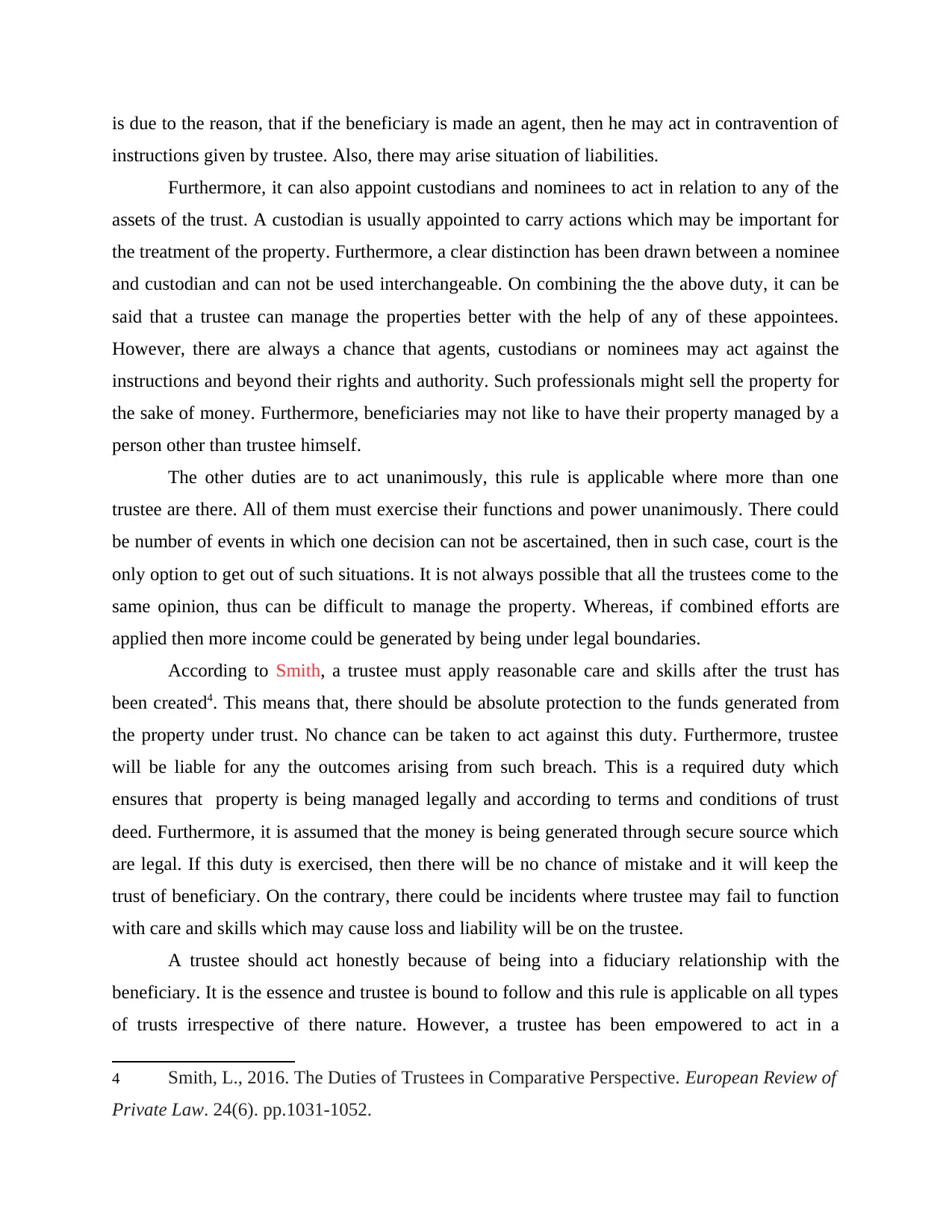
is due to the reason, that if the beneficiary is made an agent, then he may act in contravention of
instructions given by trustee. Also, there may arise situation of liabilities.
Furthermore, it can also appoint custodians and nominees to act in relation to any of the
assets of the trust. A custodian is usually appointed to carry actions which may be important for
the treatment of the property. Furthermore, a clear distinction has been drawn between a nominee
and custodian and can not be used interchangeable. On combining the the above duty, it can be
said that a trustee can manage the properties better with the help of any of these appointees.
However, there are always a chance that agents, custodians or nominees may act against the
instructions and beyond their rights and authority. Such professionals might sell the property for
the sake of money. Furthermore, beneficiaries may not like to have their property managed by a
person other than trustee himself.
The other duties are to act unanimously, this rule is applicable where more than one
trustee are there. All of them must exercise their functions and power unanimously. There could
be number of events in which one decision can not be ascertained, then in such case, court is the
only option to get out of such situations. It is not always possible that all the trustees come to the
same opinion, thus can be difficult to manage the property. Whereas, if combined efforts are
applied then more income could be generated by being under legal boundaries.
According to Smith, a trustee must apply reasonable care and skills after the trust has
been created4. This means that, there should be absolute protection to the funds generated from
the property under trust. No chance can be taken to act against this duty. Furthermore, trustee
will be liable for any the outcomes arising from such breach. This is a required duty which
ensures that property is being managed legally and according to terms and conditions of trust
deed. Furthermore, it is assumed that the money is being generated through secure source which
are legal. If this duty is exercised, then there will be no chance of mistake and it will keep the
trust of beneficiary. On the contrary, there could be incidents where trustee may fail to function
with care and skills which may cause loss and liability will be on the trustee.
A trustee should act honestly because of being into a fiduciary relationship with the
beneficiary. It is the essence and trustee is bound to follow and this rule is applicable on all types
of trusts irrespective of there nature. However, a trustee has been empowered to act in a
4 Smith, L., 2016. The Duties of Trustees in Comparative Perspective. European Review of
Private Law. 24(6). pp.1031-1052.
instructions given by trustee. Also, there may arise situation of liabilities.
Furthermore, it can also appoint custodians and nominees to act in relation to any of the
assets of the trust. A custodian is usually appointed to carry actions which may be important for
the treatment of the property. Furthermore, a clear distinction has been drawn between a nominee
and custodian and can not be used interchangeable. On combining the the above duty, it can be
said that a trustee can manage the properties better with the help of any of these appointees.
However, there are always a chance that agents, custodians or nominees may act against the
instructions and beyond their rights and authority. Such professionals might sell the property for
the sake of money. Furthermore, beneficiaries may not like to have their property managed by a
person other than trustee himself.
The other duties are to act unanimously, this rule is applicable where more than one
trustee are there. All of them must exercise their functions and power unanimously. There could
be number of events in which one decision can not be ascertained, then in such case, court is the
only option to get out of such situations. It is not always possible that all the trustees come to the
same opinion, thus can be difficult to manage the property. Whereas, if combined efforts are
applied then more income could be generated by being under legal boundaries.
According to Smith, a trustee must apply reasonable care and skills after the trust has
been created4. This means that, there should be absolute protection to the funds generated from
the property under trust. No chance can be taken to act against this duty. Furthermore, trustee
will be liable for any the outcomes arising from such breach. This is a required duty which
ensures that property is being managed legally and according to terms and conditions of trust
deed. Furthermore, it is assumed that the money is being generated through secure source which
are legal. If this duty is exercised, then there will be no chance of mistake and it will keep the
trust of beneficiary. On the contrary, there could be incidents where trustee may fail to function
with care and skills which may cause loss and liability will be on the trustee.
A trustee should act honestly because of being into a fiduciary relationship with the
beneficiary. It is the essence and trustee is bound to follow and this rule is applicable on all types
of trusts irrespective of there nature. However, a trustee has been empowered to act in a
4 Smith, L., 2016. The Duties of Trustees in Comparative Perspective. European Review of
Private Law. 24(6). pp.1031-1052.
Paraphrase This Document
Need a fresh take? Get an instant paraphrase of this document with our AI Paraphraser
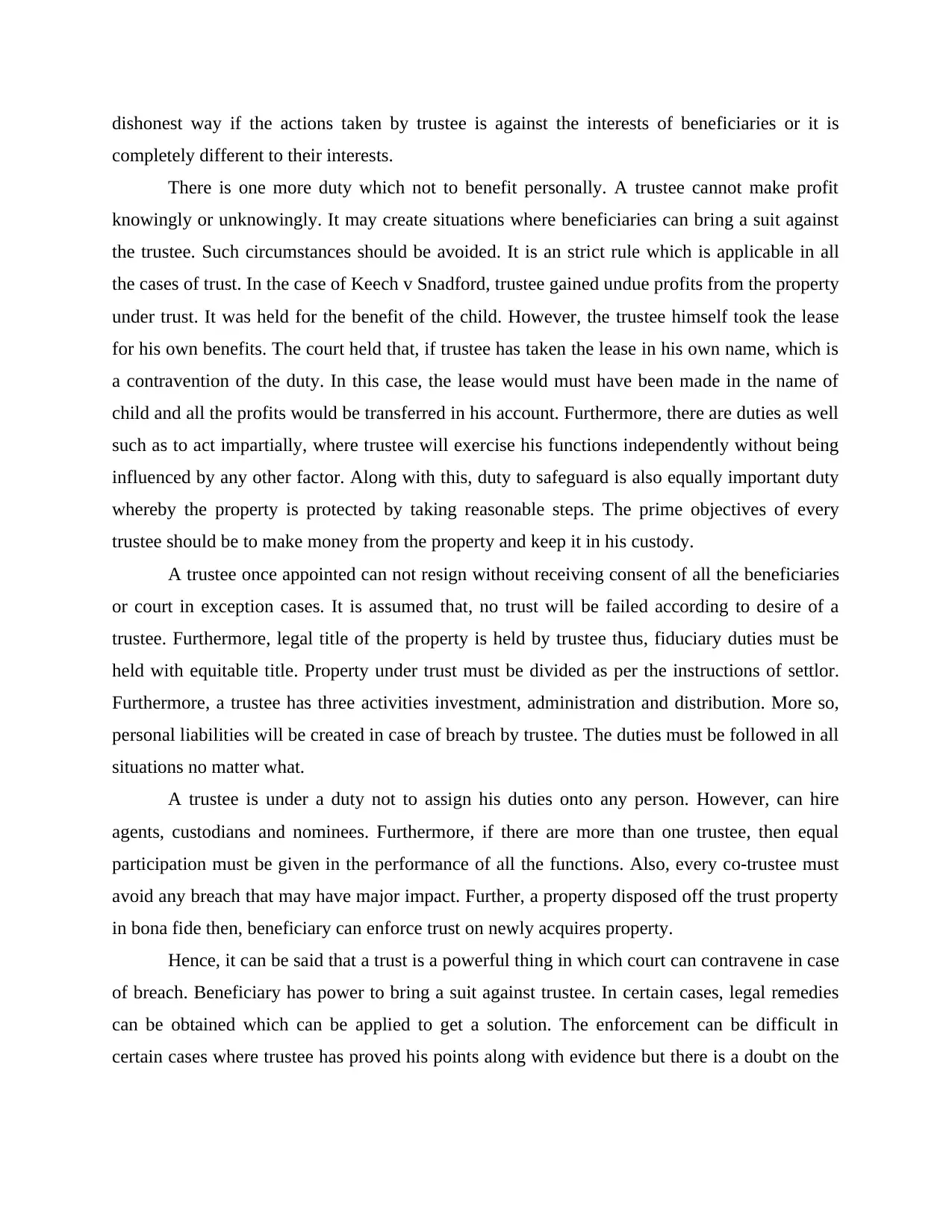
dishonest way if the actions taken by trustee is against the interests of beneficiaries or it is
completely different to their interests.
There is one more duty which not to benefit personally. A trustee cannot make profit
knowingly or unknowingly. It may create situations where beneficiaries can bring a suit against
the trustee. Such circumstances should be avoided. It is an strict rule which is applicable in all
the cases of trust. In the case of Keech v Snadford, trustee gained undue profits from the property
under trust. It was held for the benefit of the child. However, the trustee himself took the lease
for his own benefits. The court held that, if trustee has taken the lease in his own name, which is
a contravention of the duty. In this case, the lease would must have been made in the name of
child and all the profits would be transferred in his account. Furthermore, there are duties as well
such as to act impartially, where trustee will exercise his functions independently without being
influenced by any other factor. Along with this, duty to safeguard is also equally important duty
whereby the property is protected by taking reasonable steps. The prime objectives of every
trustee should be to make money from the property and keep it in his custody.
A trustee once appointed can not resign without receiving consent of all the beneficiaries
or court in exception cases. It is assumed that, no trust will be failed according to desire of a
trustee. Furthermore, legal title of the property is held by trustee thus, fiduciary duties must be
held with equitable title. Property under trust must be divided as per the instructions of settlor.
Furthermore, a trustee has three activities investment, administration and distribution. More so,
personal liabilities will be created in case of breach by trustee. The duties must be followed in all
situations no matter what.
A trustee is under a duty not to assign his duties onto any person. However, can hire
agents, custodians and nominees. Furthermore, if there are more than one trustee, then equal
participation must be given in the performance of all the functions. Also, every co-trustee must
avoid any breach that may have major impact. Further, a property disposed off the trust property
in bona fide then, beneficiary can enforce trust on newly acquires property.
Hence, it can be said that a trust is a powerful thing in which court can contravene in case
of breach. Beneficiary has power to bring a suit against trustee. In certain cases, legal remedies
can be obtained which can be applied to get a solution. The enforcement can be difficult in
certain cases where trustee has proved his points along with evidence but there is a doubt on the
completely different to their interests.
There is one more duty which not to benefit personally. A trustee cannot make profit
knowingly or unknowingly. It may create situations where beneficiaries can bring a suit against
the trustee. Such circumstances should be avoided. It is an strict rule which is applicable in all
the cases of trust. In the case of Keech v Snadford, trustee gained undue profits from the property
under trust. It was held for the benefit of the child. However, the trustee himself took the lease
for his own benefits. The court held that, if trustee has taken the lease in his own name, which is
a contravention of the duty. In this case, the lease would must have been made in the name of
child and all the profits would be transferred in his account. Furthermore, there are duties as well
such as to act impartially, where trustee will exercise his functions independently without being
influenced by any other factor. Along with this, duty to safeguard is also equally important duty
whereby the property is protected by taking reasonable steps. The prime objectives of every
trustee should be to make money from the property and keep it in his custody.
A trustee once appointed can not resign without receiving consent of all the beneficiaries
or court in exception cases. It is assumed that, no trust will be failed according to desire of a
trustee. Furthermore, legal title of the property is held by trustee thus, fiduciary duties must be
held with equitable title. Property under trust must be divided as per the instructions of settlor.
Furthermore, a trustee has three activities investment, administration and distribution. More so,
personal liabilities will be created in case of breach by trustee. The duties must be followed in all
situations no matter what.
A trustee is under a duty not to assign his duties onto any person. However, can hire
agents, custodians and nominees. Furthermore, if there are more than one trustee, then equal
participation must be given in the performance of all the functions. Also, every co-trustee must
avoid any breach that may have major impact. Further, a property disposed off the trust property
in bona fide then, beneficiary can enforce trust on newly acquires property.
Hence, it can be said that a trust is a powerful thing in which court can contravene in case
of breach. Beneficiary has power to bring a suit against trustee. In certain cases, legal remedies
can be obtained which can be applied to get a solution. The enforcement can be difficult in
certain cases where trustee has proved his points along with evidence but there is a doubt on the

outcomes. Also, different situations should be dealt in different way. Every trust is different and
requires separate solution which can be changed according to the requirements.
requires separate solution which can be changed according to the requirements.
⊘ This is a preview!⊘
Do you want full access?
Subscribe today to unlock all pages.

Trusted by 1+ million students worldwide
1 out of 6
Related Documents
Your All-in-One AI-Powered Toolkit for Academic Success.
+13062052269
info@desklib.com
Available 24*7 on WhatsApp / Email
![[object Object]](/_next/static/media/star-bottom.7253800d.svg)
Unlock your academic potential
Copyright © 2020–2026 A2Z Services. All Rights Reserved. Developed and managed by ZUCOL.





